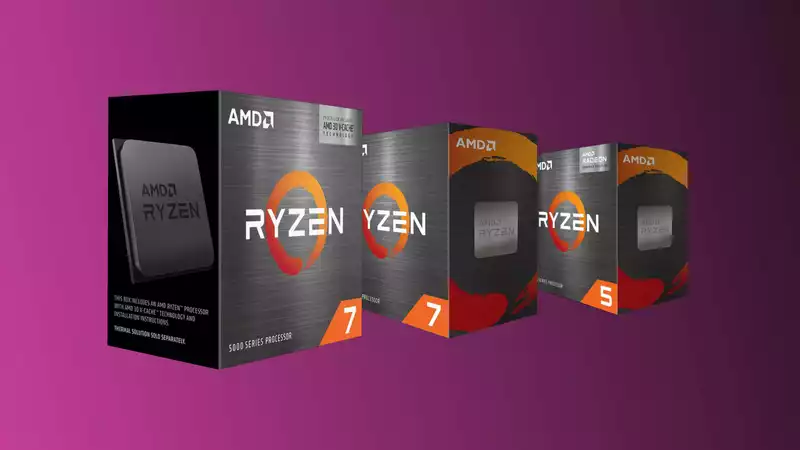AMD's last-generation desktop CPU socket, AM4, first appeared in September 2016, and most people thought that once the current AM5 hit the market, no more CPUs would be released for this older socket. At this year's CES event, AMD announced four AM4 processors: the Ryzen 7 5700X3D, Ryzen 7 5700, Ryzen 5 5600GT, and 5500GT.
Starting with the most notable, the Ryzen 7 5700X3D is essentially the same as the much-heralded Ryzen 7 5800X3D. The only difference is the lower operating speed, with the base clock dropping from 3.4GHz to 3.0GHz and the boost clock dropping 100MHz to 4.9GHz.
Otherwise, nothing has changed: 8 cores, 16 threads, 96 MB of L3 cache, and a TDP of 105 W. When this CPU was introduced in April 2022, we were amazed at how good it was as a gaming-focused CPU. However, it was quite expensive at the time, more expensive than the 12-core, 24-thread Ryzen 9 5900X. The price has since come down and AMD has set the SEP (suggested retail price) for the 5700X3D at $249. [At this point, the 5800X3D is usually around $349, so the $100 difference is definitely worth noting; for the 5700X3D, we can assign a best/worst case scenario based on the difference in clock speed alone, so no real testing is required. Depending on gaming and workload, the Ryzen 7 5700X3D is 2% to 12% slower than the 5800X3D, which is more than acceptable.
If you currently have an AM4-based gaming PC and want to extend its life, spending $249 for the Ryzen 7 5700X3D must be the most cost-effective way to go. Let's hope they have plenty in stock, because this chip will sell out quickly.
Contrary to this theme of being the same but a little slower, the new Ryzen 7 5700 may look like just a different clock for the Ryzen 7 5700X (read our review), but it is actually a completely different chip. The older 5700X has 8 cores, 16 threads, 32MB of L3 cache, and a base/boost clock of 3.4/4.6GHz, respectively. It also fully supports PCIe 4.0, allowing for very fast SSDs in gaming PCs.
The 5700 is also technically faster than the 5700X overall, with 8 cores and 16 threads and a base/boost clock of 3.7/4.6 GHz. However, it has only 16MB of L3 cache and PCIe support is limited to the older 3.0 version. The reason for this is that the Ryzen 7 5700 is actually a Ryzen 7 5700G APU, which disables the integrated GPU. This is not necessarily a bad thing, as this processor is one that we have rated very highly in the past. [However, AMD has set the SEP for the 5700 at $175, which is about $34 less than what you would pay for the 5700X at current prices. To me, more L3 cache and better PCIe support are worth more than $34, and AMD is not going to sell that many 5700s. These are obviously 5700G chips with broken GPUs that AMD is trying to move from stock. Thanks.
Rounding out the new AM4 models are two more APUs, the Ryzen 5 5600GT and 5500GT. You can definitely think of these chips as cut-down versions of the 5700G. The first chip has 6 cores, 12 threads, 16MB of L3 cache, PCIe 3.0 support, and a Radeon Vega 7 integrated GPU (i.e. 448 shaders). Base clock is 3.6 GHz, boost clock is 4.6 GHz.
The 5500GT has only 4 cores and 8 threads, otherwise the same as the 5600GT, but with a 200 MHz lower boost clock at 4.4 GHz. SEP is $140 and $125 respectively, and the Ryzen 7 5700G is considerably cheaper than the base chip, as it currently sells in the $200 range. [The 5500GT would be fine for a basic office PC that does little more than web browsing, light applications, and media consumption. On the other hand, the 5600GT has two additional CPU cores, making it suitable for lightweight, entry-level gaming, but if that's what you're really after, you're better off buying the 5700G, which has 14% more shaders on its GPU.
This may not sound like a lot, but when there are so few to begin with, every one of them counts for a decent gaming experience. Honestly, the only thing in favor of the new Ryzen 7 5700, 5600GT, and 5500GT processors is price.
Honestly, they are not bad CPUs, and if you are currently using a 1st or 2nd generation Ryzen, these will give you a reasonable improvement in gaming performance.
However, if you want an inexpensive gaming CPU for your AM4 PC, the Ryzen 7 5700X3D is the obvious choice, and if you want an APU for the same platform, the older Ryzen 7 5700G is still the best option.
It may sound like I'm being somewhat grumpy with AMD for releasing all the other chips, but I'm not: I'm genuinely happy to see a product released for a 7-year-old socket, even if it is based on somewhat lame silicon. [While these may be the last presents under the 1331-pin Christmas tree, one can't help but admire what AMD has done for this evergreen socket.
_____________________________________ PC Gamer's CES 2024 coverage is courtesy of Asus Republic of Gamers.
.

Comments